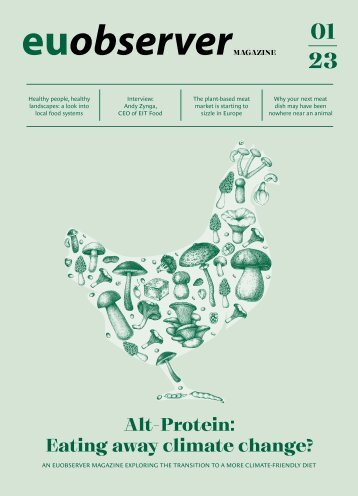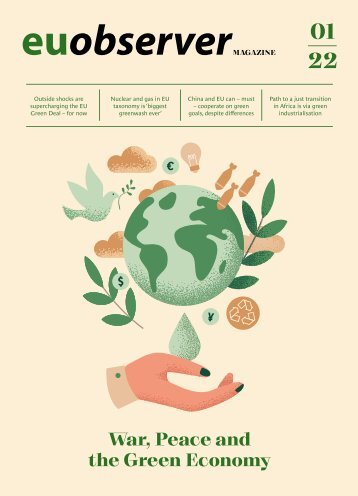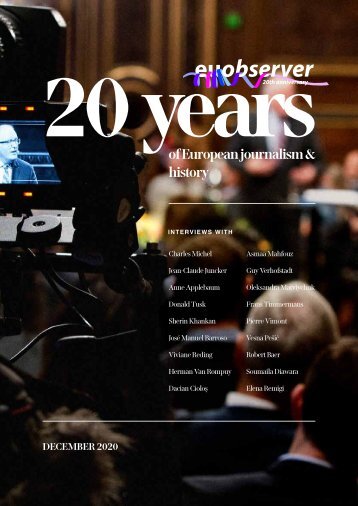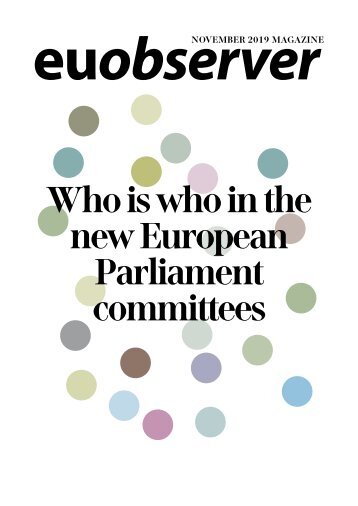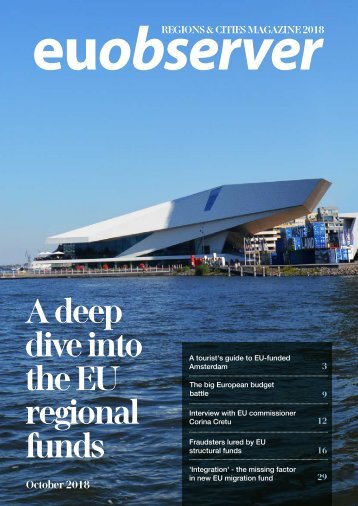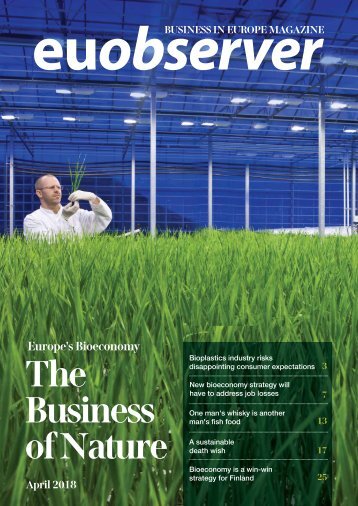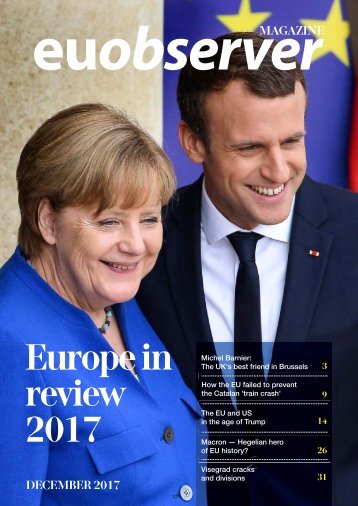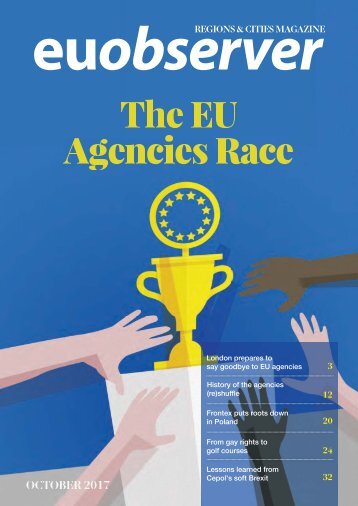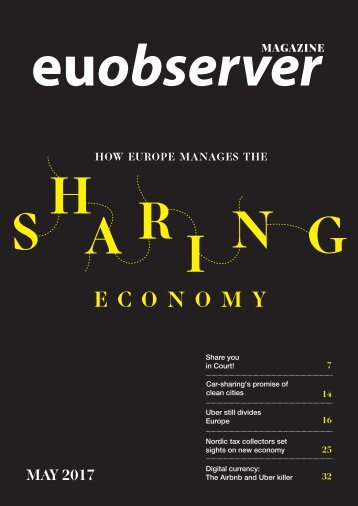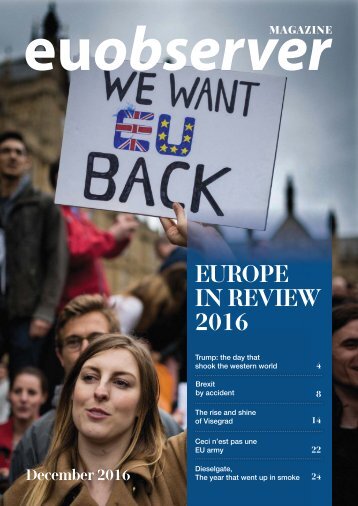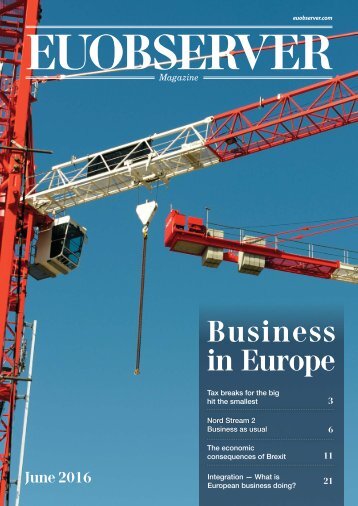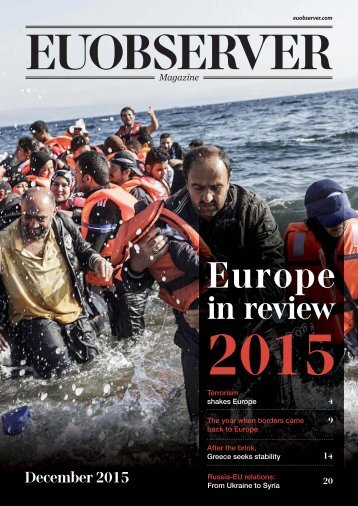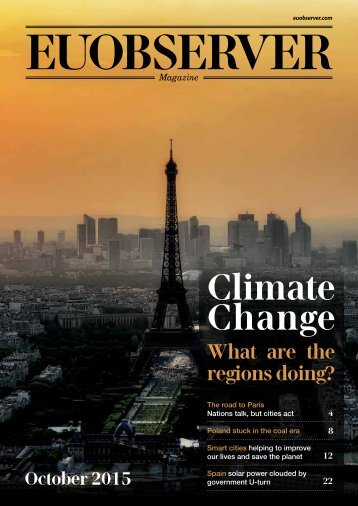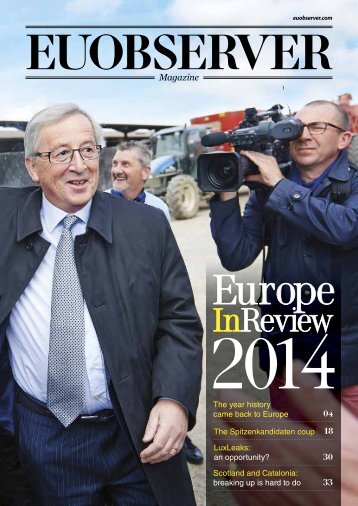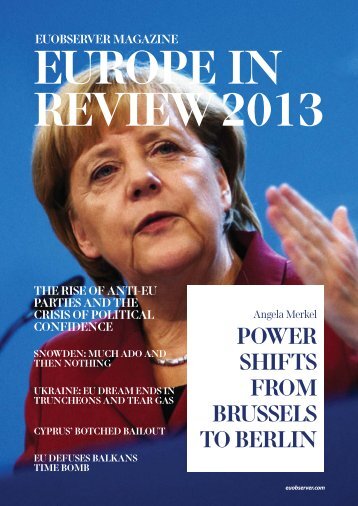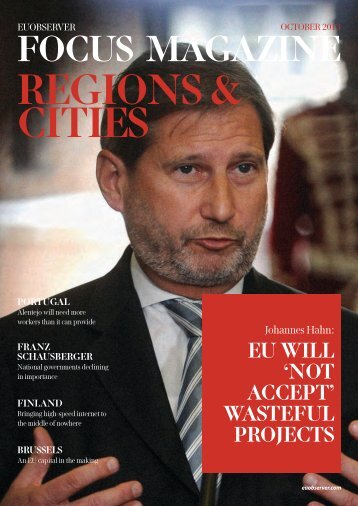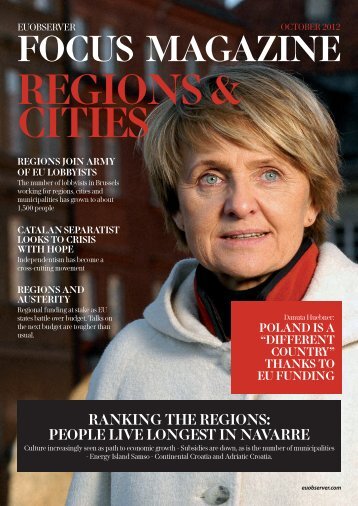Regions & Cities 2012: Economic Crisis & Austerity
- Text
- Euwrc
- Donetsk
- Europe
- Culture
- Growth
- Silesia
- Denmark
- Cities
- Catalan
- Croatia
- Economy
- Crisis
- Austerity
- Regions
- Cities
- Brussels
- Euobserver
REGIONAl FUNDING at
REGIONAl FUNDING at stake AS EU statES battle ovER bUDGEt The eurozone crisis is testing the EU’s capacity for solidarity. This is spilling over into the budget talks where different ideological camps are battling. At stake is the future size and shape of regional funding. By: Honor Mahony E U budget negotiations are famous for bringing out the worst of what’sin-it-for-me politics. Every seven years, the EU’s coffers need to be refilled. All governments contribute. The cash is then redistributed among member states who fight tooth and nail to get their due. So far, so very EU long-term budget. But the current economic crisis means talks on the next budget (2014-2020) are tougher than usual. There is less money to go around and richer states are feeling the pinch. “This is going to be an extremely important budget because Europe desperately needs growth and jobs,” says Danuta Huebner, head of the parliament’s regional affairs committee. “In the current reality, when the national budgets will continue to suffer cuts, it is the EU budget that can really be the catalyzer for investment and growth,” she adds. But it is just in the policy that is meant to boost growth – Cohesion Policy – where the hardest battle is being fought. The European Commission last year suggested a total seven-year EU budget of €1.025 trillion, €336bn was to be for Cohesion Policy. The policy, which includes the European Development Fund, the European Social Fund and the Cohesion Fund, took a hit of €18 billion compared to the current 2007- 2013 budget. A further €5.5 billion was €5.5 billion was chopped this year when the commission updated its proposal. chopped this year. And bickering among member states means a third cut is likely. This is short-sighted, believes Huebner. “This is really the investment policy and the growth policy,” she notes. “One of the values of regional policy is that it takes into the specificities of European territory. We have places in Europe where to become competitive and to grow you still need the basic investment in infrastructure. “No investor would go to a city or a region that has no connection with the rest of Europe. There is still a huge part of Europe that require investment infrastructure.” At the budget negotiation level, member states are divided into two broad camps. The first camp – including Germany, Finland and the Netherlands – say their own citizens are feeling the effects of budget cuts and a large EU budget is not justifiable. The second – broadly poorer eastern European states – say that argument does not take into account the leverage effect of EU aid money and that the cuts already made are enough. The two sides are about €100 billion apart. “It is the first group for sure that have the better argument,” said Marco Lopriore, a regional policy expert at the European Institute of Public Administration “We are in a time of economic recession. We need to bring results to the European parliament and European citizens.” The backdrop to the rich states’ argument is not only the austerity cuts sweeping Europe but also poor past records of spending EU money. Millions of euros flowed to Greece, Italy and Spain over past decades with little of use to show for them. 8 OCTOBER 2012 REGIONS & CITIES
Meanwhile, academics note that the entire debate is based on fuzzy grounds. “The problem regarding cohesion policy is that there are very few instruments to measure the impact of the investment,” said Claire Dheret of the European Policy Centre, a Brussels-based thinktank. The European Commission has conducted “a lot of studies on the achievements of cohesion policy but there are many economists who don’t agree with the model used to assess its impact.” But, says Huebner, it is all too easy just to criticise. Referring to her native Poland, an EU member since 2004, she said: “It is a different country now. That’s all thanks to European contributions, the transfer of funds.” “I often hear criticism - well there was a pizzeria financed in one of the regions - but this pizzeria is a small enterprise which gives jobs, creating the first ever restaurant in the village. This gives a lot of value.” And the parliament may turn out to be the regions’ ally in the budget negotiations. Last year MEPs suggested a five percent increase for 2014-2020 budget. Danuta Huebner - Poland is a “different country” thanks to EU funding “There is a risk that if the budget is below the expectations of the European Parliament, then we will veto it,” says the Polish deputy. Photo: EPP Group Faced with the crisis: The Regions at Europe's bedside T h e Pe s c a r a S u m m i t allowed for an in-depth exchange of views in four key fields: education and training, eco-innovation, s m a l l a n d m e d i u m enterprises, demographic change and culture. Access the resolution made at Pescara to discover the main recommendations: www.aer.eu The Assembly of European Regions (AER) has launched a large reflexion on the potential of the regional level in times of crisis. Around 100 politicians from the regions of Europe, national and European representatives, stakeholders from the private sector and associations heard this appeal and gathered last September in Pescara, in the Abruzzo Region (I), for an in-depth exchange of views. The so-called Abruzzo appeal marked the kickoff of a process that will continue until 2013 through two other summits, focused respectively on the exchange of regional successful experiences, and the implementation and outcome of the decisions made. Michèle SABBAN, AER President, invites each person willing to contribute to cure Europe to join the movement: next steps foreseen in February 2013 in Warsaw (PL) for the second act, and in May 2013 in Paris (F) for the 3 rd Summit. The Assembly of European Regions (AER) is the largest independent network of regions in wider Europe. Bringing together more than 250 regions from 35 countries and 16 interregional organisations, AER is the political voice of its members and a forum for interregional co-operation. The current negotiations on the next Multi-annual Financial Framework and EU structural funds are crucial for the future of Europe: only strong and targeted EU-wide policies, based on a genuine partnership that fully includes the regional level, can have the necessary leverage effect that will allow Europe to exit from the economic downturn. In this respect, AER warns of a macroeconomic conditionality that would hamper this leverage effect and impact negatively on sustainable growth and jobs. OCTOBER 2012 REGIONS & CITIES 9
- Page 1 and 2: EUOBSERVER OCTOBER 2012 FOCUS MAGAZ
- Page 3 and 4: REGIONS FEEl the pINCh Central gove
- Page 5 and 6: SuStainable CitieS Master of Scienc
- Page 7: Donetsk Governor Andrey Shishatskiy
- Page 11 and 12: SILESIA’S GENES FOR SUCCESS For t
- Page 13 and 14: OCTOBER 2012 REGIONS & CITIES 13
- Page 15 and 16: CultURE INCREASINGly SEEN AS path t
Inappropriate
Loading...
Mail this publication
Loading...
Embed
Loading...

